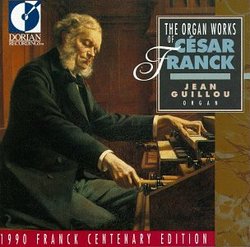| All Artists: Franck, Jean Guillou Title: Complete Organ Works Members Wishing: 1 Total Copies: 0 Label: Dorian Recordings Release Date: 8/31/1993 Genre: Classical Styles: Chamber Music, Forms & Genres, Fantasies, Short Forms, Historical Periods, Classical (c.1770-1830) Number of Discs: 2 SwapaCD Credits: 2 UPC: 053479013521 |
Search - Franck, Jean Guillou :: Complete Organ Works
 | Franck, Jean Guillou Complete Organ Works Genre: Classical
|
Larger Image |
CD Details |
CD ReviewsPERFECT DIAPASON DAVID BRYSON | Glossop Derbyshire England | 12/15/2004 (5 out of 5 stars) "Franck is probably more closely identified with the organ than any other 19th century master. In total playing time his 12 compositions for it come to about three times the length of Brahms's. This may not seem a lot, but it represents a fairly high percentage of Franck's total output, which was not huge, and it keeps matters in some kind of perspective to say that at roughly two and a half hours of music Franck's organ compositions are comparable in length to the total of the Brahms symphonies. Anything they lack in quantity they seem to me to make up for in quality. They are big in their general `feel', even the Priere and the B major Cantabile; and the three chorales, taking a quarter of an hour apiece, are not at all like what Brahms or even Bach understood by the term. This particular recording strikes me as extremely distinguished in more ways than one. It was made in 1989 using the then new organ at the church of St Eustache in Paris. The performer here is the composer Jean Guillou, well known as an interpreter of organ music from Bach onwards but also, it appears, a technical expert who actually had some input into the design of this specific instrument. The liner-note `sells' him pretty strenuously, but I buy what it's selling. There is a fine natural sense of Franck's idiom, natural as regards the lyricism, natural as regards the feeling for these large structures, natural in the rhythmic sense - I was not surprised to learn that Guillou keeps alive the art of improvisation, seemingly almost defunct these days. I am a strong enthusiast for Franck. He has a very individual and completely unmistakable personal idiom, and music lovers who know that from the symphony, the chamber works and the piano pieces will know exactly what I mean. One hears it strongly here in the three chorales in particular, Franck's last composition. He shows another side of his personality in the three `exhibitionist' works here, the Piece Heroique, the Grande Piece Symphonique and the real show-off effort, a `Finale' - Chopin wrote preludes that were not preludes to anything, Brahms wrote intermezzi that were not between anything, so it was only fair that someone should turn out a stranded finale, and what an exciting bit of work it is. The anonymous liner note is good in many ways, so good in fact that I would have wanted it better. There is a little bit about the place of these works in the composer's oeuvre, but with some reasonable amount of space available for once I would have liked less of it to go on `narrative' commentary on the individual pieces - this leads to that which is followed by the other. When all's said and done I can supply that sort of thing myself, and I would have liked more insights into the development of Franck's style, the influences on his manner and how these works stand in relation to his own other music and the music of other masters. Very properly there is an outline specification of the design of the instrument, but where the liner is particularly interesting is in what it has to say about the recording, which is quite superlative, notably in the way the quieter registers are captured but above all in its fearless handling of the bass. Indeed a thoughtful and solicitous warning is given to us to set our volume-level carefully for our own protection. I am grateful, and thoroughly taken aback by this unusual concern, but in fact I was perfectly happy with the normal volume setting that I use for most records of various types of music, and I felt no need to use any special `management'. It all gets outstandingly high marks from me - the instrument, the recording, the playing, the interpretation. If this is your kind of music, I am confident you are going to like it as done here. If you think it isn't your musical scene I still recommend giving it a try. This set has the potential for making converts." Good with reservations Starry Vere | Silver Lake OH USA | 06/20/2005 (4 out of 5 stars) "Jean Guillou is a stimulating thinker and charismatic performer. I have attended his weekly recitals at St. Eustache where he has something of a cult following.
If you want to hear someone use a state of the art computer-aided instrument to do provocative things with the Franck organ works, this is your man. However, if you prefer performances that reflect the past traditions of the works, use the distinctive sound of a Cavaille-Coll organ and hew to the composer's detailed registrations, this is anything but that. I think these are interesting readings, but they represent a contrarian viewpoint, more extrovert and oddly colored than the norm. For the old-time religion, go to Marie-Claire Alain." |

 Track Listings (6) - Disc #1
Track Listings (6) - Disc #1